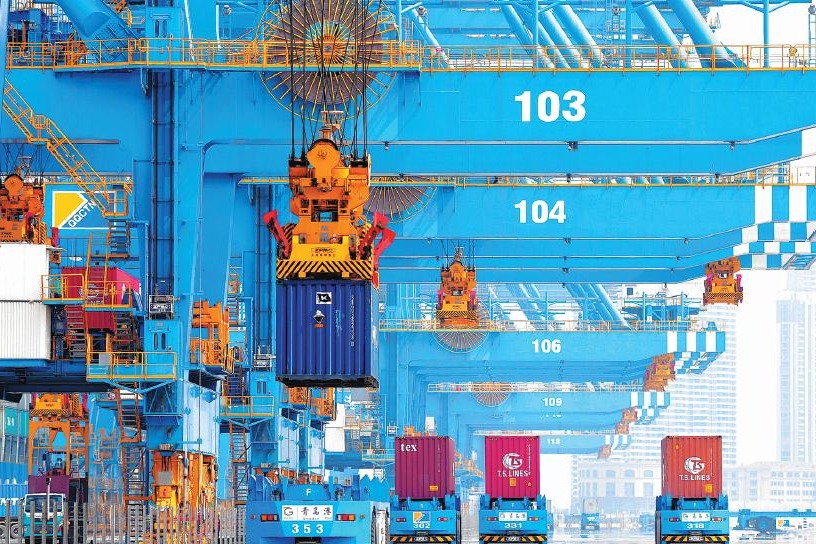Driving decarbonization forward
By leveraging their partnership, China and Brazil can accelerate the global transition to a low-carbon economy


The 2024 G20 summit in Brazil marks a critical juncture for global efforts to combat climate change. As the largest developing economies in Asia and South America, respectively, China and Brazil are uniquely positioned to lead the global decarbonization drive. Their shared commitment to sustainable development, coupled with complementary strengths, provides a strong foundation for cooperation.
China and Brazil have long acknowledged the urgent need for climate action. Both countries are signatories to the Paris Agreement and have submitted ambitious Nationally Determined Contributions aimed at reducing greenhouse gas emissions. China has pledged to peak carbon emissions before 2030 and achieve carbon neutrality by 2060. In 2023, China became the global leader in renewable energy investment, allocating over $100 billion annually to expand its wind, solar and hydropower capacities. The International Renewable Energy Agency reports that China now accounts for more than 30 percent of the world's installed renewable energy capacity, a remarkable achievement that underscores its global leadership in the sector. Meanwhile, Brazil, home to the world's largest rainforest and with significant renewable energy potential, is equally committed to decarbonization. The Amazon rainforest acts as a crucial carbon sink, absorbing millions of tons of carbon dioxide annually. However, illegal deforestation, primarily driven by agriculture and logging, threatens this critical resource. Brazil's NDCs include halting illegal deforestation by 2030 and increasing the share of renewables in its energy matrix, which already accounts for 83 percent of its electricity generation. Despite their unique challenges, China and Brazil share a mutual interest in advancing global decarbonization. Their collaboration offers a compelling model of South-South partnership, combining China's technological prowess and financial capacity with Brazil's natural resource endowments and biodiversity expertise.
China's leadership in renewable energy technologies aligns with Brazil's abundant natural resources, particularly in solar and wind energy. For instance, the semi-arid northeast of Brazil is ideal for large-scale solar farms, while its coastal areas offer immense wind power potential. By transferring advanced technologies, such as high-efficiency solar panels and offshore wind turbines, Chinese firms can help Brazil unlock this potential. Joint ventures between Chinese and Brazilian companies could also focus on energy storage solutions, addressing the intermittency issues associated with renewables. Additionally, China's expertise in smart grid technologies can help modernize Brazil's energy infrastructure, improving efficiency and reducing transmission losses.
Although Brazil is a global agricultural powerhouse, its farming practices are a major source of emissions. Adopting sustainable agricultural technologies developed in China, such as precision farming and methane-reducing feed for livestock, can help Brazil lower its agricultural emissions. Moreover, both countries could collaborate on large-scale afforestation and reforestation projects. China's experience with the "Green Great Wall" initiative — a reforestation project aimed at combating desertification — can inform similar efforts in Brazil to restore degraded Amazonian lands. Such initiatives not only enhance carbon sequestration but also promote biodiversity conservation. China's dominance in electric vehicle technology presents significant opportunities for collaboration with Brazil. With urban centers such as Sao Paulo and Rio de Janeiro grappling with severe traffic congestion and air pollution, transitioning to electric public transport is a natural solution. China can export electric buses and charging infrastructure to Brazil, while offering technical training and financial incentives. These efforts would not only reduce transportation emissions but also create economic opportunities in Brazil's EV manufacturing sector, fostering local job creation.
At the heart of the G20 summit is the critical challenge of balancing ambitious decarbonization targets with the realities of global energy security and economic growth. For China and Brazil, the summit provides a platform to amplify their partnership in driving global decarbonization while addressing systemic barriers the Global South is facing. Achieving net-zero emissions by 2050, as outlined by the International Energy Agency, requires over $4 trillion annually in global clean energy investments, with a significant share needed in developing economies. However, these regions face critical financing gaps and structural challenges. China and Brazil can take the lead in advocating for reforms in multilateral development banks to prioritize climate resilience and renewable energy projects. By aligning their bilateral initiatives with G20 goals, they can pioneer innovative financing solutions, such as green securitization, that attract private capital to sustainable projects in emerging economies.
Another challenge dominating G20 discussions is the global governance of carbon markets. While mechanisms such as carbon credit are increasingly viewed as tools to reduce emissions, they require robust regulatory frameworks to ensure transparency and prevent greenwashing. Brazil, as a leader in the bioeconomy and carbon credit trading, and China, with its experience in operating the world's largest carbon market, are uniquely positioned to contribute to these debates. Their joint efforts to propose standardized methodologies for carbon trading and monitoring can establish credibility for these markets and accelerate global decarbonization efforts.
The broader geopolitical context of the summit also shapes the discourse on decarbonization. Many emerging economies are voicing concerns that climate targets risk being weaponized to restrict development opportunities in the Global South. The collaboration between China and Brazil offers a counter-narrative: Green development can coexist with industrial growth and poverty alleviation. By highlighting their successes in advancing renewable energy, reforestation, and sustainable agriculture, the two countries can inspire other nations to pursue inclusive decarbonization pathways. Their partnership at the G20 is not just about bilateral gains; it is a call to action for the world to adopt a cooperative and equitable approach to combating climate change.
The author is a researcher at the Academy of Financial Research and an assistant professor at Zhejiang University International Business School. The author contributed this article to China Watch, a think tank powered by China Daily. The views do not necessarily reflect those of China Daily.
Contact the editor at editor@chinawatch.cn.
































